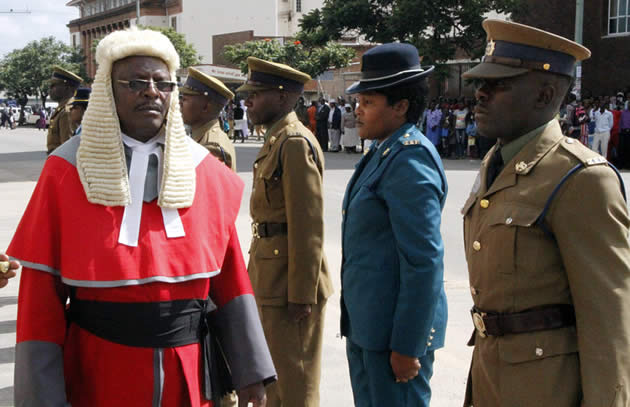By Helen Kadirire
Government is under renewed pressure for trying to illegally amend the Constitution, with the Law Society of Zimbabwe (LSZ) slamming the attempt as a move to reinstate President Robert Mugabe’s sole discretion of appointing the Chief Justice (CJ).

This comes as government is seeking to amend Section 180 of the new charter adopted in 2013, which deals with the appointment of the CJ.
A fortnight ago, Mugabe gazetted Constitutional Amendment Bill (Number 1) seeking to reinstate his singular authority to appoint the head of the judiciary, deputy CJ and judge president of the High Court, even though the 2013 charter dictates that candidates must be interviewed by the Judiciary Services Commission (JSC).
In justifying the amendments, Justice ministry permanent secretary Virginia Mabhiza argued that the drafters of the new charter did not realise that some JSC commissioners could become candidates for the position of CJ, rendering the interviewing procedure of judges by the JSC “inappropriate”.
Three candidates had already undergone public interviews — veteran deputy chief justice Luke Malaba, Supreme Court and Constitutional Court judge Paddington Garwe and Rita Makarau, chairperson of the Zimbabwe Electoral Commission (Zec) and secretary of the JSC.
Mugabe was then supposed to handpick one candidate from three names submitted by the JSC.
Justice George Chiweshe, a former head of the Zec did not turn up for the JSC interviews for unknown reasons.
However, LSZ said it was “generally dismayed by the attitude of the government towards the Constitution…”
“While we are not privy to the principles that informed the proposed amendments, we have no illusion that the effect of the proposed amendment is to substitute a relatively transparent system of judicial appointments with a murky executive-driven system resurrected from the old Constitution,” it said.
The LSZ argued that the timing of the amendments is worrying as the constitutionally-mandated process of public interviews was already underway.
They claim that by amending Section 180 into the hands of the executive, Mugabe will be both selecting and appointing authority of three of the most strategic judicial officers.
LSZ said although there may be provision to consult with the JSC, it is merely a token and can be ignored without any consequences to Mugabe’s decision.
“The amendment provides that where the president proceeds against the advice of the JSC, he shall inform the Senate. The Senate, however, has no power to overturn the appointment by the President. It will merely note.
“In the interest of accountability of arms of the State, the consultations with the JSC and then reference to the Senate should be about checks and balances.
“The proposed amendment gives unfettered power to a single individual to appoint the most influential positions in the judiciary. This has dire consequences on judicial independence,” LSZ argues.
Tapiwa Mashakada, a political risk analyst and senior opposition MDC official also said: “The Constitution is the supreme law of the land. The current Constitution is a product of a rigorous process that culminated in a referendum that adopted the document.”
“Sadly though, the implementation of the Constitution has been hamstrung by lack of political will.”
Mashakada added that the new constitution provides for the selection of judges through public interviews.
“The process has now been suspiciously stalled by a court action by one University of Zimbabwe law student who has challenged the constitutionality and legality of the public interview system. My question is: why now?”
“All along, the system has been working. Now the system is no longer wanted for the post of Chief Justice. Why, why, why?” Mashakada questioned.
“The answer is about giving back powers to the president to directly appoint his CJ.
“Is the Constitutional Amendment No 1 of 2017 not a claw back amendment?
“How independent is the court action challenging public interviews?” Daily News






